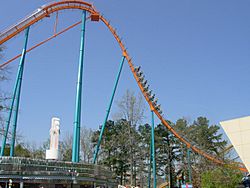Goliath (Six Flags Over Georgia) facts for kids
Quick facts for kids Goliath |
|
|---|---|

Goliath's 170-foot (52 m) first drop
|
|
| Six Flags Over Georgia | |
| Location | Six Flags Over Georgia |
| Park section | USA Section |
| Coordinates | 33°46′09″N 84°33′00″W / 33.76917°N 84.55000°W |
| Status | Open |
| Opening date | April 1, 2006 |
| Cost | $20,000,000 |
| Replaced | Great Gasp Looping Starship |
| General statistics | |
| Type | Steel |
| Manufacturer | Bolliger & Mabillard |
| Model | Hyper Coaster |
| Track layout | Out and Back |
| Lift/launch system | Chain lift hill |
| Height | 200 ft (61 m) |
| Drop | 175 ft (53 m) |
| Length | 4,480 ft (1,370 m) |
| Speed | 70 mph (113 km/h) |
| Inversions | 0 |
| Duration | 3:30 |
| Max vertical angle | 59° |
| Capacity | 1,220 riders per hour |
| Height restriction | 54 in (137 cm) |
| Trains | 2 trains with 9 cars. Riders are arranged 4 across in a single row for a total of 36 riders per train. |
|
|
|
| Goliath at RCDB | |
Goliath is a steel Hyper Coaster located at the Six Flags Over Georgia amusement park in Cobb County, Georgia, United States. Designed by Bolliger & Mabillard, it reaches a maximum height of 197 feet (60 m), and a top speed of 70 mph (113 km/h), and has approximately 4,480 feet (1,370 m) of track. Great Gasp and Looping Starship were both removed by the end of the 2005 season to make room for the roller coaster. Goliath was announced to the public on September 1, 2005 and opened on April 1, 2006. In 2006, Amusement Today's annual Golden Ticket Awards voted it the fourth-best new steel roller coaster of that year and the 9th-best steel roller coaster. It was voted the 7th-best steel roller coaster in 2013.
Contents
History
On September 1, 2005, the park officially announced Goliath, a $20,000,000 steel Hyper Coaster. By the end of the 2005 season, the rides Great Gasp and Looping Starship were closed and removed from the park to make room for the new roller coaster. Foundations for Goliath's supports began to be poured in September 2005. In early October, track began to arrive at the park; erection of the supports and track began soon after. In November and December, construction on the lift hill was complete. In March 2006, Goliath's trains were delivered to the park. After construction on the track and testing was complete, the roller coaster opened to the public on April 1, 2006.
Ride experience
After being dispatched from the station, the train makes a left hand turn towards the 197 feet (60 m) chain lift hill. Once at the top, the train drops back down 170 feet (52 m) reaching a maximum speed of 70 miles per hour (113 km/h). Following the drop, the train goes over the first of its camelback hills, crossing over the Georgia Scorcher and providing the ride's tallest drop at 175 feet (53 m). As the train exits the park boundaries, it enters a banked left turn then its second camelback hill with a 129-foot (39 m) drop. Next, the train rises back up and enters a 540-degree downward helix before passing through a set of trim brakes and going over the third camelback hill, this time with a 118-foot (36 m) drop. The train then enters a horseshoe leading back into the park, followed by the final three camelback hills with a drop height of 79-foot (24 m), 56-foot (17 m), and 48-foot (15 m), each lower than the previous one, the second of which crosses over the Georgia Scorcher's brake run. Following a banked left turn, the train makes a quick drop before entering the final brake run leading back to the station. One cycle of the ride lasts about three and a half minutes.
Characteristics
Track
The steel track of Goliath is approximately 4,480 feet (1,370 m) long and covers an area of about 8.5 acres (3.4 ha; 0.0133 sq mi). The height of the lift is 200 feet (61 m). The roller coaster has no inversions, though it does feature six camelback hills and a 540 degree helix. The track is painted orange while the supports are painted teal. Goliath was manufactured by Clermont Steel Fabricators located in Batavia, Ohio.
Trains
Goliath operates with two steel and fiberglass trains. Each train has nine cars which can seat four riders in a single row, for a total of 36 riders per train; each seat has its own individual lap-bar restraint. This configuration allows the ride to achieve a theoretical hourly capacity of 1,220 riders per hour. The structure of the trains are painted orange and teal, with matching colored restraints and seats.


